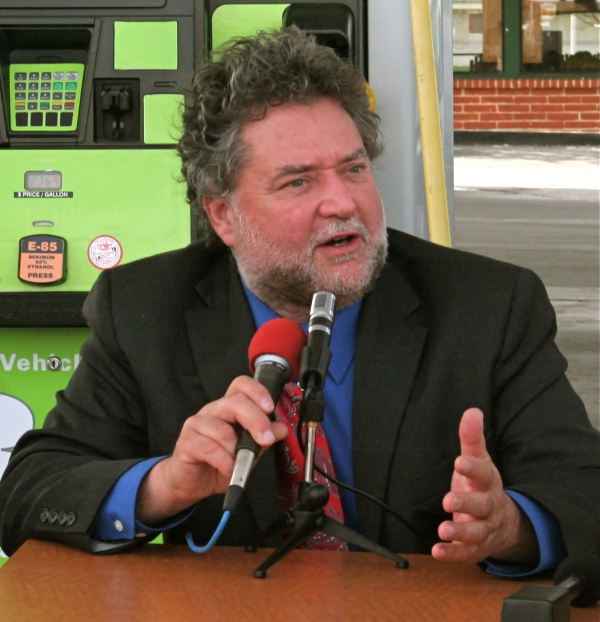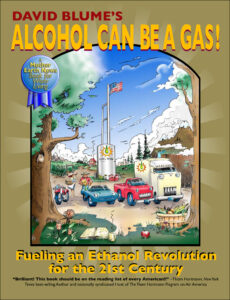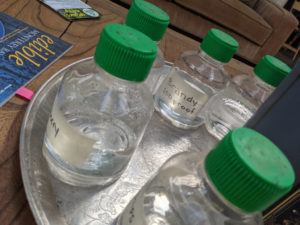
By David Blume — The overwhelming consensus in the scientific community is that global warming is causing rapid climate change, and that the cause of global warming is the burning of fossil fuels (and, to a lesser degree, deforestation). When we burn fossil fuels, we are combining hydrocarbons with oxygen. The carbon part of the fuel becomes carbon dioxide, the commonly recognized greenhouse gas; but the hydro part becomes water vapor, a greenhouse gas 20 times as potent as carbon dioxide.
So we know the problem. And we know, conceptually, the solution — we need to stop adding C02 and new aerosol water vapor to the air.
The deforestation problem points us in the direction of a practical solution for stopping global warming. The fewer plants we have, the fewer opportunities we have to take advantage of one of the most potent systems for drawing greenhouse gases out of the environment. Plants, whether they are forests, crops, or marine algae (kelp), all breathe in carbon dioxide, and all drink in water. The CO2 and water then combine with solar energy (sunshine) to make sugar. That sugar (carbohydrate) is chemically built into many plant substances, including starch and cellulose.
When we ferment and distill plants, we convert the water, carbon dioxide, and stored solar energy into alcohol. When we burn the alcohol in a vehicle, the solar energy is released and drives our vehicle down the road; and the CO2 and water are returned to the atmosphere — where the next alcohol fuel crop can use them, thereby trapping more solar energy.
So, using alcohol fuel would seem to be a carbon-neutral solar-powered transportation system that neither adds nor subtracts greenhouse gases in the atmosphere.
But when you look more deeply into plant ecology, you find that plants make several times more sugar than ends up in the fuel. Plants exude this sugar from the roots, where it feeds an enormous biomass of microscopic bacteria and fungi necessary for maintaining soil fertility. This sugar, which was very cheap to make, becomes what we farmers call organic matter, and it is largely made up of the carbon dioxide the plant took from the air.
Fossil fuel utility companies talk about sequestering to deal with the Earth’s CO2 problem — injecting CO2 deep underground, which is an energy-intensive and unproven technology.
In fact, sequestering is much more powerful when done, simply, in the soil biomass under a crop. Recent studies have shown that the amount of greenhouse gases (carbon dioxide and water) removed from the atmosphere by plants — and then exuded by plant roots to improve the soil — can be 13 times what is emitted by processing the crops and burning the alcohol in our cars. Mixed crops, as in a permaculturally designed system, produce much better sequestering than monocrops.
So, instead of just being carbon-neutral, a system of permaculturally designed energy farms could rapidly replace fossil fuels while massively sequestering surplus greenhouse gases. Just increasing the organic matter content of agricultural soils around the world a few percent would bring greenhouse gas levels back down below pre-industrial levels — in a matter of years, not centuries.
What will it take to reverse global warming using alcohol fuel? First of all, chemical fertilizers — themselves a huge source of greenhouse gases — will have to be eliminated, since they prevent accumulation of organic matter. As I point out in my book, Alcohol Can Be a Gas! the byproducts of alcohol fuel production perform much better than the chemical fertilizers we currently use. (I’ve patented a process for using alcohol fuel byproducts to eliminate the need for herbicides such as Roundup.) And the alcohol fuel byproducts do not damage the soil microlife (which perform the sequestration), while most pesticides and herbicides severely damage it. So they have to go, and it’s about time. Organic agriculture already meets and exceeds the yields of chemical agriculture, so we have nothing to fear in terms of our food supply.
The other step to reversing global warming is to build alcohol biorefineries worldwide, using a wide array of mixed crops, to produce both fuel and food. Luckily, this is inexpensive. The $500 billion we have spent in Iraq, in our quest to make sure that oil is under the control of a friendly government, would build enough biorefineries to replace all gasoline and diesel fuel with alcohol fuel, planet-wide, permanently.
The alcohol fuel solution is simple and affordable. It requires no technological breakthroughs, it works with nature instead of against it, and it solves the greenhouse gas problem permanently. Not only can alcohol replace all our transportation fuel, but it can generate all our electricity, as well.
All that stands in the way are a few dinosaur oil, natural gas, and coal companies, along with their political allies who protect these suicidal, climate-destroying businesses. Most of us have lived long enough to see politically “impossible” things happen, such as the tearing down of the Berlin Wall and the dissolution of the Soviet Union. It’s time we tear down the corporate walls between the people and an ecologically bright future powered by liquid solar energy. —06/11/2009





